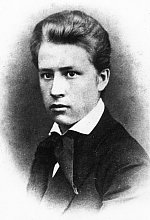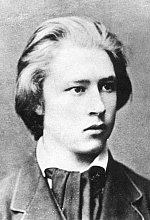| [naar
inhoudsoverzicht muziekgeschiedenis]
[naar
inhoudsoverzicht korte biografieen]
[terug naar inhoud Wolf-biografie]
[naar
literatuurlijst]
inhoud:
|
1860-1882

Hugo Wolf 1875
Hugo Wolf 1860-1903
In the subtitle of a widely circulated biography Hugo Wolf is labeled as
an "angry romantic" and this contradictory characterization seems
to fit better no other composer of importance in Vienna in the second half
of the 19th century. Both the letters, with their always new eruptions
of wrath, criticism and indignation, and the preserved photos too confirm
this general impression. There is hardly a difference between the pictures,
on each one Wolf is staring at the photographer with his dark, hypnotizing
eyes. And nevertheless, here appears only a - although essential - side
of this difficult and pithy personality. In Wolf, there were also lyric,
contained and even soulful elements.
As composer, he was a master of the small form, above all of the lied,
where he left creations of incomparable delicacy and psychological empathy,
and he found friends which saw behind the facade of the irascible and often
terribly abusive critic of the musical situation in Vienna the very vulnerable
man hungering for love and appreciation. A artist's life ending in a peaceful
finale and large success was not granted to this personality torn by inner
conflicts.
After years of mental doziness, Wolf wound up his life as patient of
the Lower-Austrian lunatic asylum. But a circle of connoisseurs and friends
recognized already at that time that the world had lost one of its most
important composers of lieder after Franz Schubert.
Childhood and school days (1860-1875)
Windischgraz (today Slovenj Gradec) is the birthplace of Hugo Wolf, who
was born on March 13th 1860 as fourth child of the manufacturer
of leather Philipp Wolf. The mother Katharina (née Nußbaumer)
of Slovenian extraction. Philipp Wolf had inherited the craftsman's establishment,
but he took his work always as a vital living which prevented him only
from pursuing his intrinsic favorite occupation: the music. In an autodidactic
way he had learned to play the piano, the violin, the flute, the harp and
the guitar and was considerably proficient in the execution.
Therefore, the musical education of his children was a real concern
to him. The boy, who learned to play the piano and the violin under the
- sometimes very vivacious - direction of his father, did not turn out
to be an infant prodigy, but showed a remarkable musical memory and an
extraordinarily sharp ear. Hugo's musical education was soon entrusted
to the municipal schoolmaster Sebastian Weixler, a friend of the family.
Hugo made great strides under the direction of Weixler. The foundation
for Wolf's later masterly command of the piano was laid here.
Hugo Wolf attended the four classes of the elementary school without
any difficulties. The first problems while attending the secondary school
in Graz, where Hugo lived - with his elder brother Max - and took music
lessons at the "Steiermärkischen Musikverein" (Styrian musical society).
He went to the secondary school only for one semester. Toward the end of
the first half-years, he was expelled from school for his "absolutely
unsatisfactory" achievements. An eventful career at school followed:
Wolf attended two classes of the secondary school at the Konvikt of St.
Paul in Lavanttal (Carinthia) and the third in Marburg an der Drau (today
Marburg). During the fourth class, both his enthusiasm for music and his
impetuous temperament were the boy's undoing. He missed school to play
as often as possible in an orchestra.
Arguments, which Wolf had - "like a madman with dark eyes blazing
with rage" - with his teachers, entailed a disciplinary conference.
But the accused forestalled it in leaving the school voluntarily and prematurely.
All this should induce the father to give way to the most ardent request
of his son and to allow him to move to Vienna and study at the conservatory
of the Gesellschaft der Musikfreunde (society of music-lovers). Philipp
Wolf viewed Hugo's plan to become a professional musician with scepticism.
Nevertheless he gave in finally. In autumn 1875, Hugo Wolf entered the
Viennese conservatory.
At the conservatory of Vienna (1875-1877)

Hugo Wolf 1875
Hugo Wolf's first and decisive meeting with Richard Wagner took
place at the beginning of his time at the Viennese conservatory. In 1875,
Wagner was in Vienna to conduct here "Tannhäuser" and "Lohengrinn"
and
to promote the first Bayreuth Festival set for the next year. After the
performance of "Tannhäuser" on November 22nd 1875, Wolf related
to his parents: "Through the music of this great master, I was totally
beside myself and became a Wagnerian." The fifteen-year-old decided
immediately to call on Wagner, who stayed at the hotel "Imperial", and
to present him his first compositions. In actual fact, he succeeded in
working his way through to Wagner, who refused yet to deal with the presented
music note manuscripts.
Hugo Wolf's teacher at the conservatory were Robert Fuchs (harmony)
and Wilhelm Schenner (piano). The teaching method of Franz Krenn,
who taught composition the following year, did not suit Wolf. He found
this kind of instruction too dry and not practice-orientated. In 1877
- he was now seventeen years old - he declared to director Hellemsberger
that he intended now to leave the institute, where he has forgotten more
things than he has learned. He regarded the immediate expulsion for "disciplinary
offense" as gross personal insult.
After having left the conservatory abruptly, Wolf continued his studies
in an autodidactic way. He had to earn himself his living. Fees for piano
and violin lessons, correcting works, coaching and dance music provided
a modest income. Into the bargain he got grants from his parents, also
help from friends, among others from Felix Mottl, Gustav Mahler,
Friedrich Eckstein, Adalbert von Goldschmidt and Hans
Paumgartner. The enthusiasm for Richard Wagner's work was the uniting
link of this circle of friends.
Early creations in Vienna (1878-1881)

Hugo Wolf 1878
The numerous compositions of the months May and June 1878 are
indicating that Wolf retired as far as possible from his circle of friends
at that time. The reason why he did that were the symptoms of the syphilis
he noticed in him - in relations with prostitutes around the turn of the
year 1877/78 he caught a disease, which cast a shadow over his following
life and finally turned out to be fateful.
In spring 1878, Wolf met Valentine ("Vally") Franck, the daughter
of a professor. He fell - according to his own words - "terribly in
love" with her. Vally Franck, according to the judgement of contemporaries
beautiful, intelligent, but a shallow character, was four years older than
Wolf. Her relation with the young composer was problematic, because Vally
spent only a part of the year in Vienna. Her departure for Bohemia on May
13th 1878 produced in Wolf a creative urge that he found - alluding
to Mozart - elementary even ten years later: "... At that time,
I composed almost every day a good lied, sometimes even two." The sorrow
of the unrequited lover was almost exclusively the main motive of these
lieder, the texts were mostly by Heinrich Heine.
Also the next year an intensive creative phase followed upon Vally's
departure. This time, texts by Nikolaus Lenau inspired Word. Foreign
parts, loneliness and yearning for death - to these themes he was particularly
partial and they are also in the letters of this period, which were dominated
by self-pity, bitterness and the feeling of being outcast.
Meeting with Johannes Brahms (1879)
An unpleasant meeting of Wolf and Johannes Brahms occurred early
in 1879. Wolf, who spoke later with vehement rejection about Brahms's
works, was at that time still a enthusiastic admirer of Brahms' music.
For him, that was not contradictory to his enthusiasm for Wagner. The details
of the meeting with Brahms were handed down by Max Kalbeck, which description
of Wolf was determined by antipathy. Brahms was just sitting at the grand
piano, when he heard a "suspect sound" at his glass door.
He had a great deal of difficulty with showing the visitor - Hugo Wolf
- into the room, because he kissed the handle over and over again. The
presented compositions did not impress Brahms favorably: "I went through
everything closely with him and pointed a few things out to him. Some talent
did exist, but he was taking it too lightly. I told him then very seriously
what he was lacking, recommended counterpoint studies to him and referred
him to Nottebohm. He had enough there and did not come back anymore. Now
he fumes and foams." Despite his indignation, Wolf has probably taken
Brahms's advice seriously to talk to Gustav Nottebohm. Only the amount
of the fee brought him to remain an autodidact.
Years of uncertainty (1881-1883)
In this period, Wolf's financial situation touched bottom. The correspondence
with his father bears witness to this. Philipp Wolf did support his son
time and again, but he talked also very seriously to him: "What is the
good of your stay in Vienna? In influential circles you are not popular
and with your temperament you will not ingratiate yourself, even your supposed
friends do nothing for you, they have at best nice words or alms - that
is all. I feel sorry for you and your inability to put up with all the
situations..." The circumstances were improving early in 1880.
The Preyss family took Wolf in the "Marienhof", a country house
near Mayerling. In the security of their home and surrounded by a landscape,
which inspired him to enthusiastic descriptions, he had the opportunity
to read manifold books. Preyss looked always after new reading. Wolf read
Goethe,
Lenau,
Heine,
Kleist,
E. T. A. Hoffmann and
Jean Paul, among the non-German poets
he discovered and liked Turgeniev, Leopardi, Scott, Mark Twain, Dickens,
Sterne, Molière and Rabelais.
In Mayerling he continued his work on his string quartet in D minor,
which occupied his mind already since 1878. He finished the work only in
1884. The quartet bears numerous signs of thorough studies of the late
quartets and sonatas by Beethoven. Wagner's influence is negligible. The
winter 1880/81 brought a new crisis: Wolf's relation with Vally Franck
was shattered for good. The shock, that this event produced in Wolf, found
expression in the six "Geistliche Lieder" - adapted from Joseph von Eichendorff
- composed in April 1881.
Choir conductor and conductor in Salzburg (1881-1882)
In autumn 1881, Wolf was appointed as choir conductor of the municipal
theater of Salzburg through the intermediary of Adalbert von Goldschmidt.
Now he held for the first time a musical office. The father congratulated
enthusiastically: "A thousand times good luck for your new and first
position - it is the only ready consolation in my miserable life that you
are doing well and reach your goal, therefore diligence, patience and perseverance!"
The
paternal admonitions referred to the fact that Wolf had to deal in Salzburg
with music which did not answer to his primary interests. He had to conduct
rehearsals of operettas by Millöcker and Strauß and had proved
himself efficient in this task at first.
I a short time he was appointed as second conductor. On December 21st
1881he conducted "Waffenschmied" by Lortzing. Wolf knew of course
that he lacked any practice as conductor. In addition there was his impetuous
temperament which let the musicians antagonize him. Endless rehearsals
of trivial operettas made high demands on his patience. Karl Muck remembered
a rehearsal of an operetta by Strauß concluded by Wolf with the words:
"Leave that thing as it is, I will better play some 'Tristan' for you."
The intermezzo in Salzburg ended already in spring 1882: Wolf himself tendered
his resignation in the vague hope of a post in Frankfort, which turned
out to be illusionary.
|